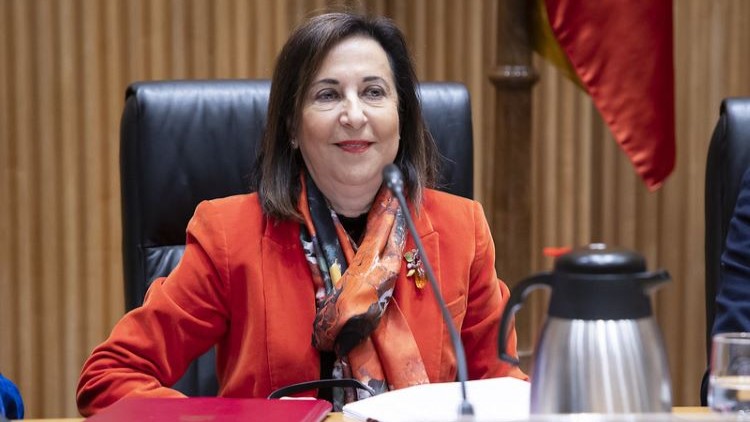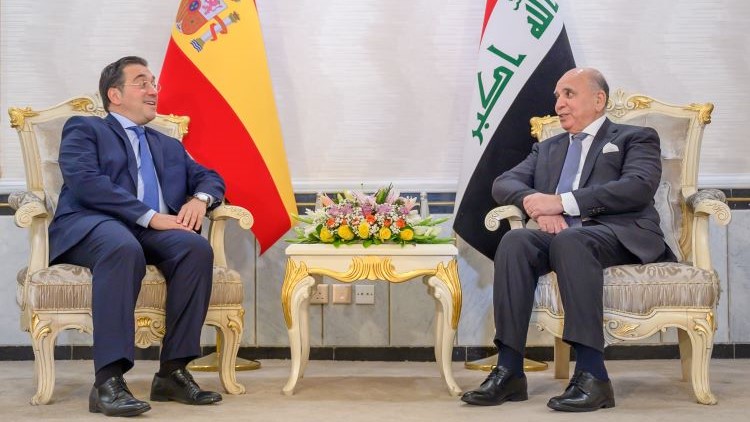Eduardo González
More than 12,000 Spanish soldiers and civil guards participated in some of the contingents deployed by Spain abroad in 2023, making our country the largest contributor to EU missions and the fourth in NATO.
This was announced yesterday by the Minister of Defense, Margarita Robles, during her appearance before the Defense Commission of the Congress, in which she reported on the missions abroad of the Armed Forces during 2023.
“I have to say, with satisfaction, that at this moment Spain is the country that makes the greatest contributions to missions within the EU and the fourth within NATO”, which reflects “Spain’s commitment to peace.” said the minister.
In “a complex and unstable geostrategic scenario” like the current one, as a consequence of the war in Ukraine and Gaza and an increase in security threats in the Sahel, a total of 12,075 soldiers and civil guards participated throughout 2023 in some of the contingents that Spain has deployed in the 17 missions abroad, “of which 9.9% were women,” she continued.
According to Robles, the missions in which the Spanish Armed Forces participate are grouped into two blocks: “those whose main objective is to guarantee deterrence and defense and those in which the purpose is the projection of stability.”
“The war in Ukraine and the threat that Russia’s attitude poses to the security of the States of Europe, especially for our partners and allies on the Eastern flank, has led to an important reinforcement of the policy of deterrence and collective defense” by part of NATO, which “has meant an increase in the troops deployed by all allies and, therefore, obviously by Spain,” she explained.
Within this framework, NATO’s Reinforced Forward Presence (eFP) operation in Latvia is being developed, led by Canada and whose objective is to “contribute to deterrence by the Alliance and, where appropriate, to the defense and protection of Latvia or from any other Baltic country or Poland.” Spain has a contingent of 700 troops in this mission, “mainly personnel from the Aragón I Brigade and the Anti-Aircraft Artillery Command.” “I had the opportunity to be in Latvia in the first days of December and with our contingent, and I can assure you that it is an honor to see our men and our women,” she said.
In addition, the Spanish Armed Forces have also assisted NATO in aerial police operations in Romania or Estonia or in reinforcing anti-aircraft defenses in Lithuania or Romania, “which the Alliance countries themselves have asked of Spain,” she continued.
Likewise, she continued, “about 2,500 soldiers from the armies and the Navy” have participated “to date” in the European Union Military Assistance Mission to Ukraine (EUMAN UA), which provides general and specialized training to the soldiers of that country. country and from which “more than 3,300 Ukrainian soldiers” have benefited.
Within the concept of deterrence there is also the support mission to Turkey, with the deployment of a Patriot unit, made up of 138 troops. The personnel of this mission, according to Robles, “played a very prominent role alongside the UME in humanitarian aid in the terrible earthquake” that devastated the country. Likewise, Spain participates in NATO’s Permanent Naval Groups, within the framework of the Alliance’s Very Rapid Response Forces.
Lebanon and Iraq
As for the stability missions, the United Nations mission in Lebanon (UNIFIL) stands out, first of all, led by Spain under the command of Lieutenant General Aroldo Lázaro (with whom the Minister of Foreign Affairs, José José, met this week Manuel Albares, during his tour of the Middle East), “whose mandate has been, precisely because of its effectiveness, recently renewed until February 2025.”
According to Robles, 656 soldiers and seven civilians (interpreters) are deployed in ‘Operation Free Hidalgo’ that monitors the border line (Blue Line) between Lebanon and Israel. “In addition, under Spanish command, there are Serbian, Salvadoran, Brazilian, Argentine, Indonesian, Indian, Nepalese and Kazakh soldiers,” she added.
In this area, the minister recalled, there has been an increase in tension as a result of the crisis generated by the Hamas attacks against Israelis on October 7 and the military response of the Government of Benjamin Netanyahu. “Despite the harassment between the parties, through the Blue Line, the Spanish forces continue to operate on the ground, fulfilling their mission, in a situation of enormous risk,” she assured.
In Iraq, Margarita Robles recalled, the head of the NATO mission is (since May 2023) another Spaniard, Lieutenant General José Antonio Agüero (whom Albares also visited yesterday). “In contrast to those who say that Spain is not involved and does not participate, I believe that these leaders highlight Spain’s commitment,” she said.
In this country, she recalled, the Spanish contingent has two pillars: on the one hand, the international Coalition to defeat Daesh through Operation Inheret Resolve and, on the other, the NATO Mission in Iraq (NMI), which aims to complement to the previous one, focusing on advising the Iraqi authorities for the development and strengthening of their security and defense institutions, as well as the achievement of conditions and capabilities that make the return of Daesh impossible. The future of Inherent Resolve “is in question because the Iraqi Government has serious doubts and has told us that this mission will probably not continue,” she said.
Atalanta and the Red Sea
Margarita Robles also dedicated a few words to Operation Atalanta to combat piracy in the waters of the Gulf of Aden and Somalia, “which these days has been topical,” whose Headquarters is located at the Rota Naval Base and whose commander is another Spanish: Vice Admiral Ignacio Villanueva Serrano.
According to the minister, “despite the fact that the phenomenon of piracy had been contained since 2019, the situation in the area of operations has deteriorated considerably in recent months, with various incidents of assault on ships on the high seas occurring.”
Regarding the “great work that the frigate Victoria is carrying out in the Indian Ocean,” she warned, “to pretend that, from this mission, with a single frigate, missions could be carried out in the Red Sea, is to completely ignore the reality of what happens in the Indian Ocean and the great work carried out by the Spanish Navy in following up and monitoring piracy.” The immediate future of the Operation foresees the replacement of the Victoria frigate by the Canarias frigate, which will remain in the area from next February until June.
With respect to the Sahel area, where there are Spanish troops in Mali under the EU umbrella, Minister Robles acknowledged that “last year there has been a loss of European influence” in the entire region and that the continuity of EUTM Mali is pending a strategic review, scheduled for 2024.







